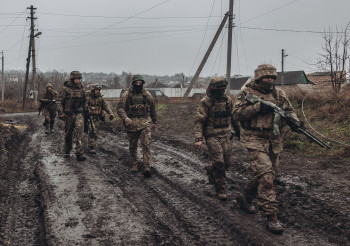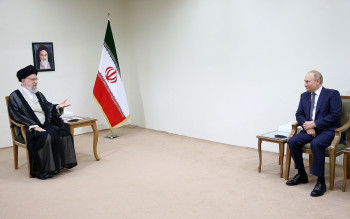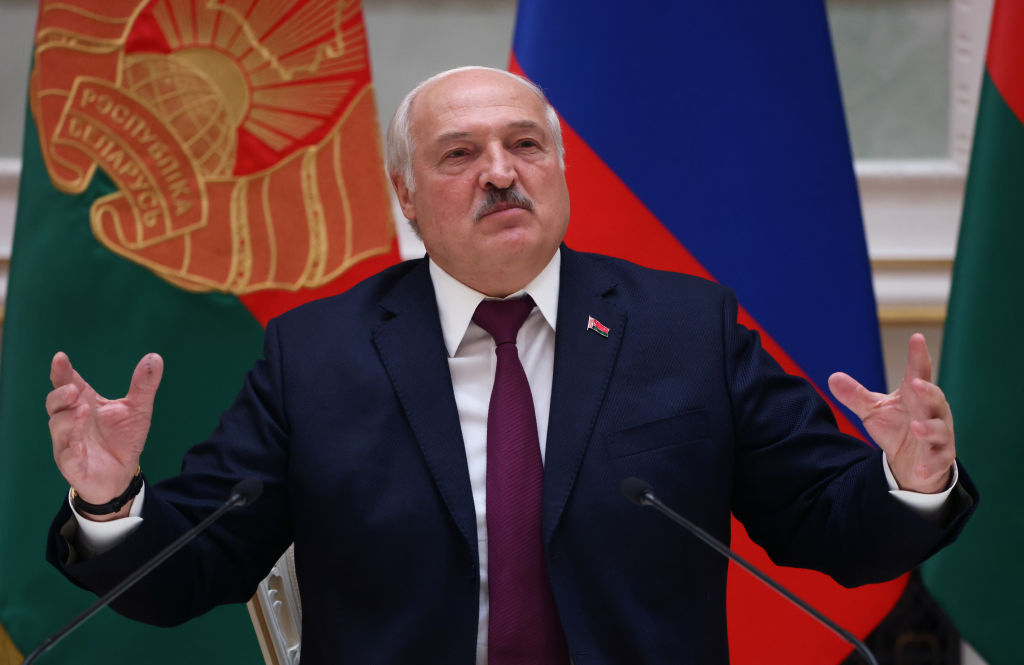Russian President Vladimir Putin's visit to Belarus on Dec. 19 didn't deliver any particular results.
Routine statements about joint exercises, a new round of nuclear blackmail, and assurances that Russia will not annex Belarus were among the key talking points during Putin's press conference in Minsk.
Russia again began increasing its military presence in the country, delivering more than 100 pieces of equipment to Belarus' where Russian troops are stationed as part of the joint military command.
The Belarusian Hajun monitoring group wrote that military equipment was moved closer to the border with Ukraine.
The level of ongoing repression in Belarus spiked. A threefold increase in the number of detentions, harsher punishments, and longer sentences have been reported.
Human rights activists say Belarusians have been arrested at the border after returning home.
The first prison sentence for violating the government-imposed moratorium on price increases resulted in a two-year prison term for a businessman from Mahiliou.
Putin meets Lukashenko, talks joint drills while ignoring Russia's war in Ukraine
Putin met with Belarus dictator Alexander Lukashenko in Minsk on Dec. 19. This was Putin's eight meeting with Lukashenko in 2022.
However, it was the first time since 2020 that the meeting took place in Belarus.
While blatantly ignoring the ongoing war against Ukraine in which both Russia and Belarus are complicit, Putin and Lukashenko agreed to continue the practice of joint military exercises and develop new military equipment, forming a "single defense space."
Lukashenko claimed that Russia has transferred to Belarus S-400 missile systems and Iskander short-range ballistic missile systems, which have already been deployed.
Putin announced that Russian soldiers would train Belarusian pilots on aircraft re-equipped "for the possible use of airborne ammunition with a special warhead," referring to Kinzhal missiles and nuclear warheads.
Putin alleged that Belarus' de jure independence is safe for now.
"Russia has no interest in any merger," said Putin, who launched a full-scale war against Ukraine in February.

This comment was "coming from a leader seeking to violently absorb his other peaceful next-door neighbor," U.S. State Department spokesman Ned Price said.
Price added that Washington would continue to watch closely whether or not Belarus would provide additional support to Russia.
Belarus has taken part in Russia's war against Ukraine since February by providing its territory for Moscow's troops to launch ground and missile attacks against Ukraine.
The Institute for the Study of War reported that Lukashenko has likely managed to deflect Putin's efforts to coerce Belarus into further Russian-Belarusian integration.
Foreign Minister Dmytro Kuleba said, "nothing dramatic happened during this meeting."
Belarusian analysts tend to view the visit as mostly symbolic.
Political analyst Alexander Klaskovsky noted that the emphasis on economics signifies tensions in the country's bilateral relations and further integration.
Russia transfers more military equipment to Belarus, deploys closer to Ukrainian border
At least three Russian echelons loaded with military equipment arrived in Belarus last week, delivering around 100 Ural trucks, gasoline trucks, and four infantry fighting vehicles, Belarusian monitoring group Belarusian Hajun reported.
Echelons arrived on Dec.12 and Dec. 14, carrying up to 60 Ural trucks and infantry fighting vehicles. The monitoring group suggests that equipment is intended for use by the Russian troops stationed at the Abuz-Liasnouskiy training range in the Brest region.
On Dec. 16, the Belarusian independent railroad workers' union reported another delivery of Russian military equipment received in the Mahiliou region, next to the Asipovichskiy training range, also hosting Russian troops.
On Dec. 20, Belarusian Hajun noticed the re-deployment of Russian military equipment closer to the border with Ukraine.
Twenty-three T-80 tanks and nine Ural and KamAZ trucks were transferred from the Abuz-Liasnouskiy range to Luninets, Brest region.
Over 20 tanks and about 16 Ural trucks were relocated from the Lepelskiy range in the country's north to Slutsk, Minsk region. Twenty infantry fighting vehicles and seven Ural trucks arrived at Kalinkavichi, Homiel region.
However, the group emphasizes that the amount of equipment moved to the border is insufficient for crossing the border with Ukraine.
The Russian Defense Ministry announced on Dec. 19 that Russian and Belarus troops are to conduct military exercises.
Ukraine's Defense Minister Oleksii Reznikov claimed the risk of a renewed invasion from Belarus persists, but there aren't immediate threats.
A Russian aircraft arrives in Belarus, conducts training flights
A Russian long-range radar detection and control aircraft arrived at Belarus' Machulishchy airfield on Dec. 14, according to Belarusian monitoring group Belarusian Hajun.
The Il-76 A-50U is reportedly designed to track air and surface targets. Several training flights were conducted over Belarusian territory within a week.
"These drills are conducted for the sole purpose of spotting targets on Ukrainian territory, (and) are intended for missile strikes (against Ukraine) by the aggressor," Ukrainian Lieutenant General Serhii Naiev said on Dec. 20.
"We are taking all measures to reduce this threat," he said.

Belarus issues first prison sentence for raising consumer prices
On Dec. 19, a Belarusian court issued the first sentence for violating Lukashenko's ban on consumer product price hikes.
A 46-year-old shop owner in Mahiliou was sentenced to two years in prison for raising the price of cheese by 26 kopeks ($0.10).
On Oct. 6, Lukashenko announced a ban on price increases for consumer goods in Belarus due to "exorbitant" inflation.
The ban was effective immediately, and Belarusian authorities conducted raids at grocery stores to monitor price tags for various goods.
Lukashenko claimed on Oct. 10 that the ban is temporary until more permanent means to regulate prices are determined. He did not mention those against whom criminal cases have been filed for violating the order.
On Oct. 27, business owners across 13 cities and towns in Belarus declined to open amid price regulations imposed by Lukashenko's regime. Some business owners that ceased operations were reportedly afraid of punishment given the ambiguity of price regulations.
Watchdog: Belarusians returning to country detained at border
Human rights watchdog Viasna reported that authorities detained at least 10 Belarusians following border control checks upon their arrival in Belarus from Poland on Dec. 19.
According to the watchdog, those detained are accused of participating in the protests following the 2020 Belarusian presidential election, deemed fraudulent by the international community.
Aliaksandr Azarau, the head of BYPOL, an association of exiled former Belarusian law enforcement officers that oppose Lukashenko's regime, said it is not common for Belarusian authorities to detain people at the border.
3.5 times more detentions were reported in autumn compared to summer
The pace of repressions in Belarus has accelerated in the autumn of 2022, with 3.5 times more detentions than during the summer of 2022, according to the Belarusian Change Tracker, a quarterly report published by the Friedrich Ebert Foundation.
The report cites 350-420 detentions per month throughout fall as opposed to 100-120 detained during summer 2022.
Additionally, the number of politically motivated trials increased from 84 to 145 per month and resulted in harsher punishments.
In an attempt to silence the exiled independent media, Lukashenko's law enforcers are pressing charges for giving interviews to media outlets critical of the regime.
The Independent Journalists Union reports that over 3000 websites were shut down by the regime in 2022, comprising a third of the total amount of banned sites in seven years.
In 2021, 684 websites were listed as extremist.













